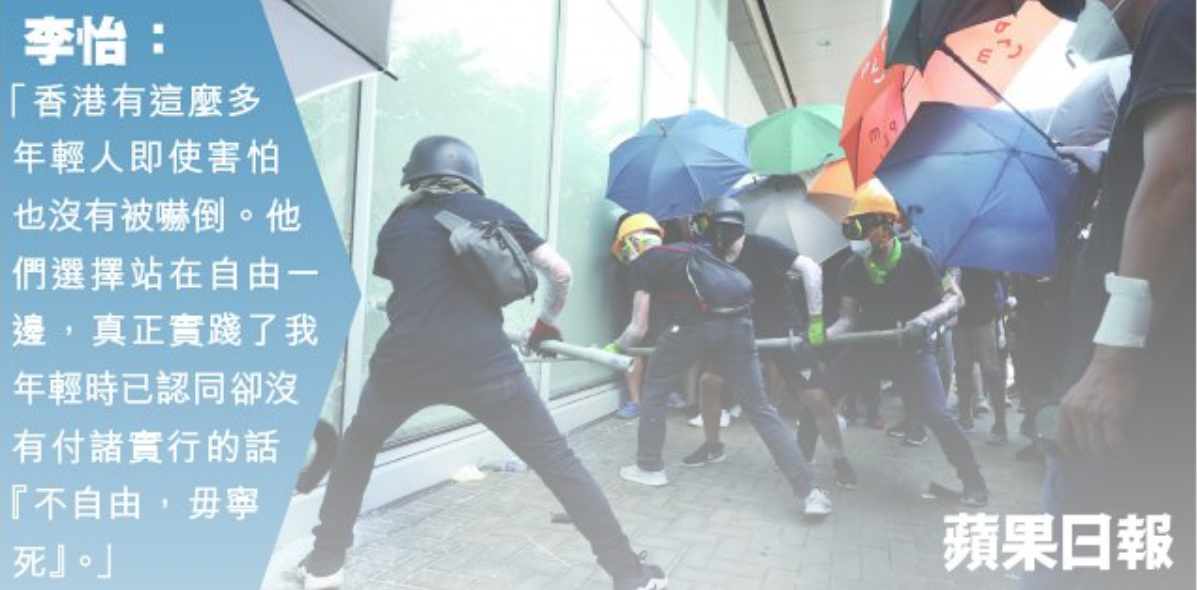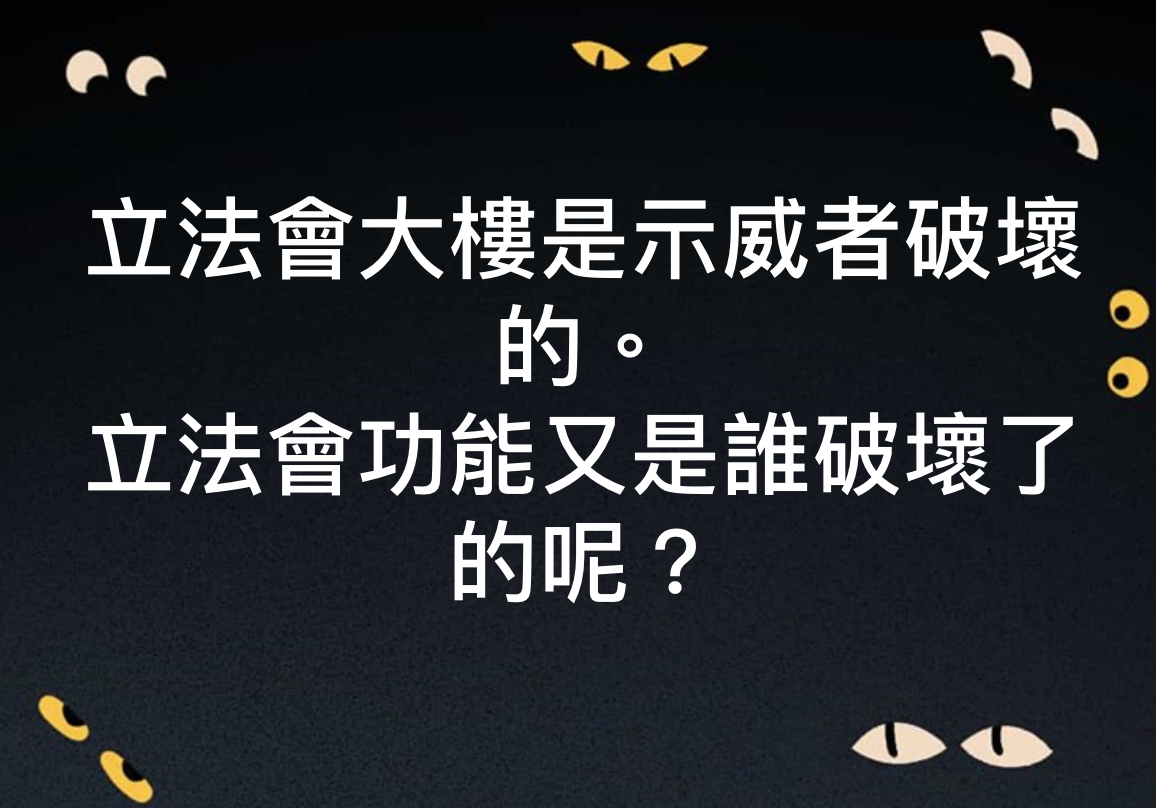The Best China
In this latest instalment in our series ‘The Best China’, we offer a meditation by the veteran journalist Lee Yee 李怡 (李秉堯) on the Anti-Extradition Bill Movement of Hong Kong. Founding editor of The Seventies Monthly 七十年代月刊 Lee Yee has been a prominent commentator on Chinese, Hong Kong and Taiwan politics, as well as the global scene, for over forty-five years. He has analysed Hong Kong politics and society with a clarity of vision, and in a clarion voice, rare among the territory’s writers.
Lee Yee’s appreciation of Young Hong Kong is in stark contrast to the ideal ‘New Person’ 新人 xīn rén supposedly being forged on the Mainland. ‘Homo Xinensis’ — that is, ‘Xi Jinping-era Chinese people’ — is a socially engineered and compliant hybrid species: model consumer-comrade-citizens. For more on this subject, see:
- Homo Xinensis, China Heritage, 31 August 2018
- Homo Xinensis Ascendant, China Heritage, 16 September 2018
- Homo Xinensis Militant, China Heritage, 1 October 2018
The following essay is translated from ‘Ways of the World’ 世道人生, the column Lee Yee writes for Apple Daily 蘋果日報.
— Geremie R. Barmé
Editor, China Heritage
16 July 2019
***
Further Reading:
- Qu Weiguo 曲衛國, ‘The Uselessness of Freedom’, China Heritage, 22 June 2019
- Louisa Lim, ‘Hong Kong Has Nothing Left to Lose’, The New York Times, 2 July 2019
- Stormtrooper 白兵, ‘The Fifth Power’ 第五權, 2 July 2019 (Cantonese with subtitles)
- Jiayang Fan, ‘The Disillusion and Frustration of a New Generation is Fuelling Hong Kong’s Protests’, The New Yorker, 3 July 2019
- Alvin Lum, ‘ “It wasn’t violence for violence’s sake”: the only unmasked protester at storming of Hong Kong’s legislature gives his account of the day’s drama’, South China Morning Post, 5 July 2019
- Regina Ip, ‘Hong Kong Is a Work in Progress’, The New York Times, 5 July 2019
- Amy Qin, ‘Hong Kong Protesters Take Their Message to Chinese Tourists’, The New York Times, 7 July 2019
- Stéphanie Giry, ‘The Extraordinary Power of Hong Kongers’ Solidarity’, The New York Times, 8 July 2019
- Ching Kwan Lee, ‘Hong Kong’s new political lexicon’, Los Angeles Times, 8 July 2019
- Lee Yee 李怡, ‘Endgame Hong Kong’, China Heritage, 5 July 2019
- Radio Television Hong Kong, ‘Hong Kong Headliner — Kill Bill’, China Heritage, 14 July 2019
***

Young Hong Kong
香港這代年輕人
Lee Yee 李怡
Translated by Geremie R. Barmé
When the anti-Extradition Bill protesters launched their assault on the glass doors of the Hong Kong’s Legislative Council building on 1 July, there were those who were quick to claim that the instigators behind it all were actually agent provocateurs. When police withdrew just before the demonstrators broke through the doors, people declared in no uncertain terms that the government had deliberately done this so as to entice the demonstrators inside. When the invaders wrought havoc the authorities would be able to claim the moral high ground.
7.1開始撞立法會玻璃門時,有人說帶頭的人是「鬼」;示威者破門前,警察突然撤出立法會,有人說是政府有意設空城計陷阱,誘導示威者入內破壞,讓政府重佔道德高地。
But do you want to know what the young protesters themselves thought? We now know that they were just fine if it turned out that the storming of LegCo was spearheaded by government agents, since it allowed the protesters a chance to blitz an entity that for years has ben enacting odious laws. It was also fine by them if it eventuated that the police had set a trap for them since, if they hadn’t done so, the protesters would have confronted an armed force head on inside. That would have certainly have resulted in bloodshed, if not the loss of life.
要知道年輕示威者怎麼看嗎?他們說有「鬼」帶頭撞門很好,我們可以順勢衝擊這個近年專門製造惡法的機構。警方擺空城計很好,否則我們進入後與警察難免正面衝突,那就一定會流血甚或傷亡。
Initially, I accepted the first interpretation of those dramatic events — that is the speculation about government agents and police entrapment. I did so because there was a real gap between my understanding of what was going on and the on-the-ground perspective of the young demonstrators. They weren’t concerned about all that talk to do with plots and stratagems; they had no interest in rumours about ‘agents provocateurs’. That’s because, regardless of all that white noise about the government’s chicanery, none of it was going to deter them from taking actions that they thought were necessary.
我起先都相信前一說法,這就是我與年輕人的思想距離。他們對陰謀論根本不理會,被人說是「鬼」沒有感覺,而說甚麼人是「鬼」、甚麼是陰謀,都不能影響他們做自己認為應該做的事。
The June-July Anti-Extradition Bill Protest Movement of 2019 has been led by young people — Young Hong Kong. It has challenged and overturned many of our preconceived notions. Previously, many pan-democracy activists clung to a range of views about just what was and was not possible, as well as what should and should not be done. All of that has been shown up as being meaningless. Now, Young Hong Kong has done many things that we previously had thought to be impossible, including using crowd funding to publish advertisements about the movement in the international media. And they have accomplished all of it without setting up large stages or podiums during the mass rallies; they have done it without identifiable leaders or at the behest of a political party. Regardless, they have been successful in mass mobilisation undertaken with seamless co-ordination; and, what’s more, they have done so without rancour, free of internal wrangling and with remarkable efficiency.
They have also engaged in actions that the older generations regard as being beyond the pale, or that certainly would be seen as being be injurious to efforts to win over average Hong Kong residents. Then, on top of all of that, they have launched actions that everyone believed were off limits, such as surrounding Central Police Headquarters or storming the Legislative Council chambers. Yet, by their very nature and daring, the actions of Young Hong Kong have elicited sympathy and support from the majority of Hong Kong people. They have made people question the right of the government to respond to such overt challenges with violence. One oft-repeated slogan of the movement is eloquent in its simplicity:
‘We are not violent rioters; you are a violent government’.
這次完全由年輕人帶動的反送中運動,許多我們固有的思維被打破,許多過去民主派認為應該或不應該有的行為模式都無意義。沒有大台、沒有領導者、沒有政黨,而行動能夠一致並完美配合,無爭吵、無內鬥,效率驚人,做出許多我們認為不可能做到的事,比如眾籌登世界各媒體廣告;也做出老一輩的人認為出格的、不利於爭取市民同情的,甚至不該做的事,比如包圍警總和衝擊立法會。而他們的感人表現也使大部份市民認同他們的行為,讓政府對「暴力」的話語權受到質疑。「沒有暴動,只有暴政」的宣示獲廣泛認同。

***
The much-awarded film director Jevons Au Man Kit [歐文傑, 1981-, director among other works of ‘Ten Years’ (2015)] has frequently participated in the protests. The police beat him so badly on 12 June that they fractured his hand. Despite the pain he gave an interview to Hong Kong Citizen News in which he said: ‘I’ve learned so many things from these young protesters.’ In the month since then, I believe that many, many others have come to share a similar sense of having been roused out of their complacency by Young Hong Kong.
新晉導演歐文傑多次出現在抗爭現場,6.12他被警察狠打一棍,令他手骹移位觸及筋骨,在接受《眾新聞》訪問結束時,他紅着眼說:「我喺年輕示威者身上,學咗好多嘢。」過去月餘,相信許多人都有被年輕人喚醒的感覺。
The two most important things that I have learned are:
- First, older people like me need to cast off the shackles of past experience. I need to realise that, even if one’s efforts may be doomed, by not acting you are simply giving in to failure; and,
- Secondly, I need to overcome my fears. Virtually all of the young people who launched that assault on LegCo, as well as those who got inside, said that they had been ‘terrified’. They were right to feel afraid, that’s because they were confronting a superior force that was armed to the teeth. They also knew that they were also facing a legal system the could well sentence them to anything from eight to ten years in prison for their actions. But being ‘terrified’ did not stop them from doing what they felt was right. The more social experience you have the harder it is to act.
我學到的最重要兩點,一是我們老一輩絕不能被固有的經驗束縛,對任何可能性的嘗試,即使不一定成功,但不敢嘗試就一定失敗。二是戰勝恐懼,幾乎所有年輕人在衝擊時或進入立法會後,都說「好驚」。他們確實是應該「驚」的,因為面對的是全副武裝的強大暴力,是可以被判十年八年的惡法。但「好驚」並不能使他們在該做的事情上止步,這是在社會歷練越久的人就越難做到的。
Following the terrorist attack of 11 September 2001, Salman Rushdie, the author of The Satanic Verses who had been condemned to death in a fatwa issued by Iran’s Ayatollah Khomeini [in February 1989], wrote the following words:
‘Democracy requires visibility … and in the struggle between security and freedom we must always err on the side of freedom … How to defeat terrorism? Don’t be terrorised. Don’t let fear rule your life. Even if you are scared.’
記得2001年911後,曾因寫《撒旦詩篇》而被伊朗宗教領袖下達全球追殺令的英國作家Salman Rushdie寫下這樣的句子:「民主必會隨着公平到來,在自由和安全的矛盾中,我們一定要永遠選擇站在自由一邊,即使選擇錯了也絕不後悔。怎樣才能擊敗恐怖主義?不要被嚇倒,不要被恐懼支配,即使你害怕。」
Watching the live broadcast of the events on the night of 1 July for a few minutes I felt the urge to rush over to LegCo so I could express my support; but then I hesitated; I allowed fear to overrule my actions. Who wouldn’t be terrified and hesitate when contemplating all those heavily armed police and the threat of a long prison sentence? The fear was made all the more palpable by the fact that our local mechanisms of repression are backed up by the most formidable terrorist power in the world.
I was unprepared for the dawning realisation that so many members of Young Hong Kong would not be intimidated despite the fear they felt; they were determined to ‘err on the side of freedom’. Their actions were a vivid expression of a sentiment that, in my own youth, I notionally supported even if I was never called upon to act on it. That is the credo: ‘Give me Liberty, or Give me death’. On the night of 1 July, tears of shame ran down my cheeks.
7.1晚上看直播,我有兩分鐘想跑去立法會表達支持,卻被恐懼支配。面對全副武裝的警察,面對十年八年的刑期,怎能不害怕?更何況這個體制暴力的背後,是全球最大的恐怖主義權力。我絕沒有想到香港有這麼多年輕人即使害怕也沒有被嚇倒。他們選擇站在自由一邊,真正實踐了我年輕時已認同卻沒有付諸實行的話「不自由,毋寧死」。我一邊流淚一邊感羞愧。
People whose spirits are enslaved become inured to their benighted state; they crave personal wellbeing rather than daring to resist. Despite all of that, one Mainlander offered the following observation online:
‘This generation of Hong Kong young people will be remembered by history. They are confronting an impossible situation and they are facing down a pitiless foe. They have endured the indifference both of the Mainland and of Taiwan, as well as that of the international community. Yet they have continued their lonely struggle regardless; theirs is a kind of courage that choses to be ‘like shattered jade rather than merely surviving as an undamaged adornment of coarser stuff’.
‘Our reactions as Chinese to their acts of resistance are fraught with contradiction. No one doubts that the Communists want to transform the people of Hong Kong in such a fashion that they end up being just like any other group of commonplace Chinese. But the people of Hong Kong demonstrate that they would rather be defeated in clamorous and glorious struggle than herded like pliant swine. Each time they go into the streets to protest, the people of Hong Kong relentlessly humiliate every single Chinese person — all 1.4 billion of us.’
習慣做奴隸的人,受壓迫不會去抗爭而是自求多福。但在大陸網頁居然讀到這麼一段話:「香港這代年輕人是注定要載入史冊的。面對艱難的局面、最冷酷的敵人;面對兩岸三地、國際社會的冷眼旁觀,孤軍奮鬥,寧為玉碎不為瓦全。中國人看港人的抗爭,心情是複雜的。中共無非是想把港人變成普通中國人。港人的態度是寧可轟轟烈烈地死,也不做窩窩囊囊的豬。每一次抗爭都是對14億人的無情羞辱。」
While such a sentiment is worthy of serious reflection, it won’t necessarily inspire pride in Young Hong Kong: they know all too well that ultimate success is indeed far from being assured.
這段話值得反覆深思,但一定不會使香港年輕人驕傲,因為離成功似乎還很遠。
***
Source:
- 李怡, 香港這代年輕人, 《蘋果日報》,2019年7月15日

